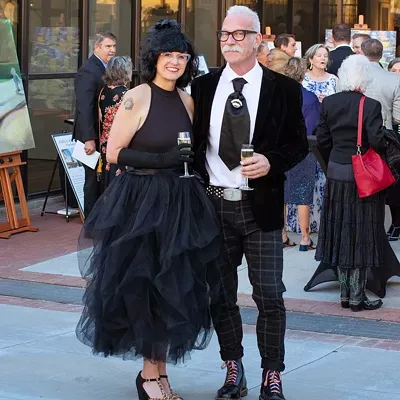We know that the issues, beliefs or theories that have an "ism" attached are hardly set in stone. In fact, if such a school of thought has reached a point that it qualifies for identification as an "ism," its substance is assuredly uncertain. Many are, after all, "movements."
Gina Gionfriddo's play Rapture, Blister, Burn, getting a workout by the folks at Live Theatre Workshop, gives an intelligent whack at the pinball nature of feminism—first wave, second wave and whatever wave we might be riding at the moment. Although the play gives us quite a history-cum-philosophy lesson (it's very talky), it does so with well-enough drawn characters that the lesson goes down with the spoonful of gin or the six-pack of beer that a few of those characters seem to rely on with regularity.
The play begins with husband Don (Stephen Frankenfield) and wife Gwen (Janet Roby) welcoming Catherine (Shanna Brock) back to her hometown on a trip to see her mother.
Catherine is a rock-star academic. Her good looks and classy demeanor bolster her brain power to the point of an invitation to be on the panel of Bill Maher's HBO show. The three of them were friends during their college years, spending lots of time drinking while plumbing intellectual depths.
Catherine and Don were a thing, but when she was pegged for a prestigious fellowship in London and invited Don to come with her, Don opted to stay home. That left the possibility of a liaison between Gwen and Don, which has indeed come to pass. They've been married for almost 15 years and have two sons.
Gwen felt out of place between the two braniacs and so she drank—a lot. She's sober now that she has assumed the role of wife and mother, though she has become a talk-a-holic and a hyper-controlling manager of her family.
The three friends had planned on going out to have a homecoming celebratory dinner, but Gwen demands its cancellation when the babysitter (Brie Zepeda) shows up with a black eye and mandates Don to send her home, not wanting her children to witness such a thing.
Gionfriddo is smart enough to place her talky tale in a context involving professors and deans and degrees, and most of the first act is actually set in a classroom of sorts, even if it's the living room of professor Catherine's mother Alice (Toni Press-Coffman).
In that classroom, we are immersed in a discussion of what feminism was and is, surprisingly giving Phyllis Schlafly (the outspoken anti-feminist who had made feminists really, really mad a couple of decades ago) more than a chunk of validation. The class consists of professor Catherine and students Gwen and black-eyed babysitter Avery. When Alice joins them as the class concludes, they each offer takes on being female that are more grounded in their own realities through the years, rather than as doctrine. This particular conscious-raising session comes with dry martinis, rather than with mirrors, to allow you to take a look at your own—well, you know.
What emerges, predictably, is that Catherine needs more family love—hence her return to keep her mother alive, or, more accurately to be with her so she has some sense of family—and Gwen feels she has given up too much of her intellectual, more ambitious self, while Don has come to prefer pot and porn. The answer, naturally, is to switch lives. Gwen will move to Catherine's New York home with her older son, with whom she has a real sense of connection, while Catherine will stay in the Mayberry-with-a-Crappy-College home of Don, who is Crappy College's dean, with the younger son. And, yes, she and Don still possess a passion that makes this arrangement desirable.
This should work, right? Well, it does for a while, and it's really more P.C. than it seems, really, as the women choose what they think they want. But there are those pesky variables, one of which in this case is ambitionless Don, who runs smack dab into the swinging bat of power-hitter Catherine when she suggests he write a book.
The cast is a good one. Brock fits into Catherine's pumps pretty perfectly: sleek, stylish and smart and also willing to listen and confess vulnerability. Roby's talkative Gwen is powerful, even when she doesn't think she is. Frankenfield is usually totally wound with intensity on stage, so he has a challenge to be the tamped down Don, but he pulls it off well. Press-Coffman makes sure the martini glasses appear at the right time, and quietly contributes to the often-racy discussion of the women's generational differences. Zepeda is both hilarious and eyebrow-raising as the epitome of post-feminism, revealing unapologetically her rather raucous edition of womanhood, while still puzzling over what lies in store for her.
Director Rhonda Hallquist has done a good job with this interesting piece. It's funny and smart and allows—even encourages—us to ask tough questions, while at the same time it is more than willing to declare that this particular "-ism" remains open to discussion.






